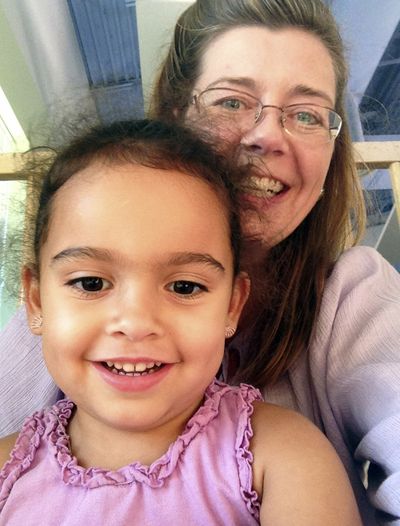Adoptive parents given girl
Order leaving Cherokee child with biological father dissolved

OKLAHOMA CITY – A South Carolina couple who vowed last month to not leave Oklahoma unless they went home with a 4-year-old Cherokee girl they have been trying to adopt since her birth were given custody of the girl Monday night after the Oklahoma Supreme Court said it didn’t have jurisdiction over the child.
“She’s safely in her parents’ arms,” said Jessica Munday, a spokeswoman for Matt and Melanie Capobianco of Charleston, S.C.
Cherokee Nation spokeswoman Amanda Clinton confirmed that Veronica was handed over to the Capobiancos hours after the Oklahoma Supreme Court dissolved a temporary court order leaving the child with her father and his family. Until the Monday night transfer, the Cherokee Nation had insisted the girl would remain with the tribe.
The Capobiancos and the girl’s biological father, Dusten Brown, had fought over custody of the girl for years. The dispute has raised questions about jurisdictions, tribal sovereignty and a federal law meant to help keep Native American tribes together.
Veronica, whose biological father is a member of the Cherokee Nation and whose biological mother is not Native American, had lived with the Capobiancos from birth until she was 27 months old, when Brown was awarded custody under the Indian Child Welfare Act. But a U.S. Supreme Court decision later went against Brown, and a South Carolina court finalized the Capobiancos’ adoption of her earlier this year. Brown had then turned to Oklahoma’s courts.
It wasn’t known if there were any conditions attached to the Capobiancos gaining custody, including whether Brown would be allowed to visit the girl.
Cherokee Nation Attorney General Todd Hembree told the Tulsa World that Veronica’s transfer to the Capobiancos does not mean the custody fight is over. “We will assess our legal options in the morning,” he told the newspaper.
He said the Cherokee Nation had been prepared to require that the issue be handled in tribal court, but that Brown decided it was in Veronica’s best interests to proceed with a “peaceful and respectful transfer.”
Munday said she was not sure when the Capobiancos planned to return to South Carolina with Veronica, but said she felt they were now free to do that at any time. She said Veronica has spent some time with the couple recently and did remember them.
“It was smooth. There wasn’t any danger. … Hopefully everyone can focus on healing now,” said Munday, a friend of the family.
When the Oklahoma justices bowed out, it left in place a South Carolina court order validating the Capobiancos’ adoption and a Cherokee Nation tribal court directive that said the girl could remain with family members of Brown while he was undergoing National Guard training.
The Oklahoma Supreme Court had halted the girl’s transfer to the Capobiancos while it considered the case. The court did not explain its decision to lift its stay Monday.
After the girl’s transfer to the Capobiancos, the National Indian Child Welfare Association put out a statement saying it was saddened by the events.
“The legal system has failed this child and American Indians as well. Our prayers are with everyone concerned, but most of all with Veronica,” said Terry Cross, the group’s executive director.
Veronica’s birth mother was pregnant when she put the girl up for adoption, and the Capobiancos took custody of Veronica shortly after birth.